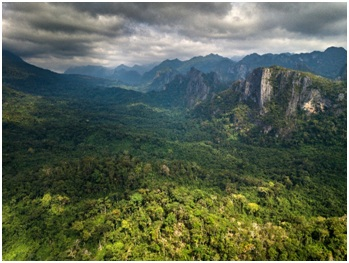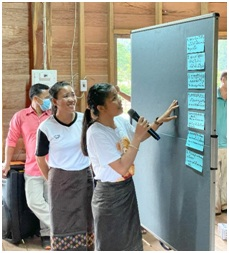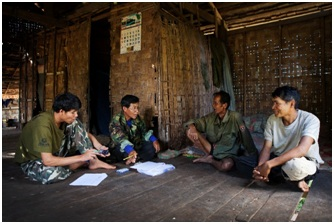ຂປລ
A key part of the Hin Nam No National Park’s World Heritage nomination, which connects it to Vietnam's Phong Nha Ke Bang, involved a transformative approach: Free, Prior, and Informed Consent (FPIC). This means ensuring local communities are not just consulted but are active participants in the process.

Karst landscape of Hin Nam No National Park
(KPL) A key part of the Hin Nam No National Park’s World Heritage nomination, which connects it to Vietnam's Phong Nha Ke Bang, involved a transformative approach: Free, Prior, and Informed Consent (FPIC). This means ensuring local communities are not just consulted but are active participants in the process.

FPIC consent mission at Nongping (Photo: GIZ/ProFEB)
From 2019 to 2023, Khammouane province, with support from the Lao German cooperation project "Protection and Sustainable Use of Forest Ecosystems and Biodiversity" (ProFEB), implemented by GIZ, worked directly with the villages surrounding Hin Nam No in Bualapha District of Khammouane Province.
This wasn't merely about completing a formality; it was about genuinely empowering ethnic groups and local communities, respecting their rights, and developing tools for their own ownership. It's about building a future where conservation and community needs go hand-in-hand.

Community rangers, Hin Nam No National Park (Photo: GIZ/Lucas Wahl)
The Protection and Sustainable Use of Forest Ecosystems and Biodiversity in Laos (ProFEB) is co-funded by the German Federal Ministry for Economic Cooperation and Development (BMZ) and the European Union. ProFEB is the forest component of “Team Europe Partnership with Lao PDR to increase sustainable and inclusive trade, investment and connectivity in the agriculture and forestry sector (TICAF).”
The full story, including the challenges and successes of FPIC process in this link: https://conbio.onlinelibrary.wiley.com/doi/10.1111/cobi.14388
https://www.giz.de/en/worldwide/140382.html
https://www.giz.de/en/worldwide/140483.html
KPL